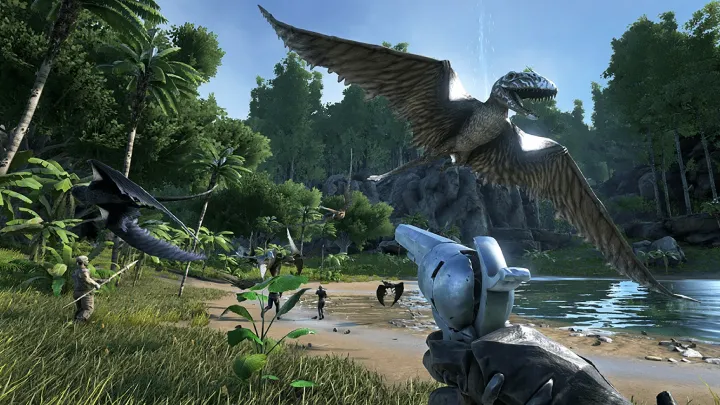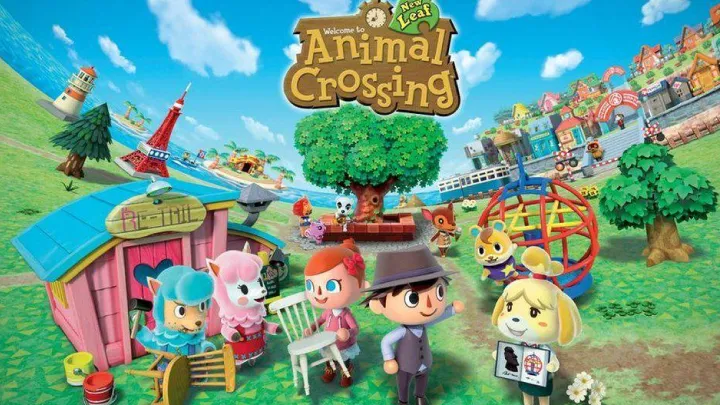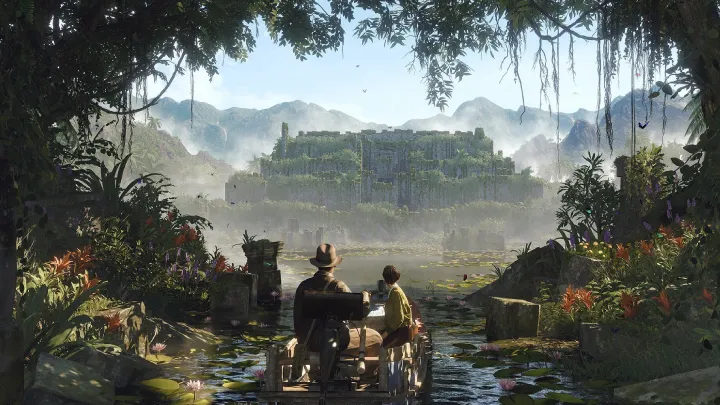
ARK: Survival Evolved, developed by Studio Wildcard, immerses players in a vast, open-world environment filled with prehistoric creatures and survival challenges. Since its early access launch in 2015, the game has captivated audiences with its blend of survival mechanics, crafting, and exploration. However, beneath the surface of taming dinosaurs and building shelters lies a profound exploration of survival, community, and identity. This article will delve into the complex themes of survival and identity in ARK: Survival Evolved, examining how players navigate the challenges of a hostile environment while forging their unique identities in a world dominated by both nature and their fellow survivors.
The Setting: A World of Danger and Opportunity
Entering the ARK
The game begins with players waking up on a mysterious island, known as an “ARK,” surrounded by a plethora of prehistoric creatures and natural hazards. This initial setting serves as both a playground and a battleground, where players must quickly adapt to survive. The island is teeming with life, from the smallest insects to the towering T-Rex, creating a sense of wonder and danger that permeates the gameplay experience.
The environment is designed to challenge players, pushing them to gather resources, craft tools, and build shelters. This struggle for survival sets the stage for the exploration of identity, as players must confront their limitations and learn to adapt to the challenges presented by the ARK. The initial moments of the game highlight the urgency of survival, compelling players to engage with their surroundings and forge their paths.
The Ecology of the ARK
The ARK is not just a backdrop; it is a living ecosystem with intricate interdependencies. The presence of various biomes—such as lush forests, arid deserts, and frozen tundras—creates diverse challenges for players. Each biome is inhabited by unique creatures and environmental hazards, requiring players to adapt their strategies to thrive.
This ecological diversity enhances the survival experience, as players must learn to navigate the specific challenges of each environment. Understanding the behaviors of dinosaurs, gathering resources, and crafting suitable gear becomes essential for survival. The player's ability to adapt to the ecology of the ARK is a crucial aspect of their journey, reflecting the ongoing struggle for identity in a world defined by constant change and unpredictability.
The Mechanics of Survival: Crafting and Resource Management
The Necessity of Crafting
At the core of ARK: Survival Evolved lies a robust crafting system that enables players to create tools, weapons, and structures. Gathering resources—such as wood, stone, and fiber—is essential for survival, as players must craft items to protect themselves and thrive in the environment. This emphasis on crafting encourages players to engage with the world actively, fostering a sense of agency and creativity.
The crafting system allows for a personalized approach to survival. Players can choose to focus on different aspects of crafting, such as building elaborate bases or developing advanced weaponry. This freedom of choice enables players to express their identities through their strategies and playstyles, reinforcing the idea that survival is not just a matter of endurance but also of creativity and ingenuity.
Resource Management: A Balancing Act
Resource management is a critical aspect of survival in ARK. Players must balance their needs for food, water, and shelter while managing their inventory and crafting materials. This balancing act creates a sense of urgency, as players must constantly assess their surroundings and make strategic decisions to ensure their survival.
The pressure of resource management can lead to moments of tension and excitement. Players must prioritize their actions, deciding whether to hunt for food, gather materials, or explore new areas. This decision-making process reflects the complexities of survival and identity, as players navigate the challenges of the environment while shaping their own experiences.
The Role of Dinosaurs: Allies and Adversaries
Taming Dinosaurs: Building Relationships
One of the most distinctive features of ARK: Survival Evolved is the ability to tame and ride dinosaurs. This mechanic transforms the relationship between players and the creatures of the ARK, shifting from adversaries to allies. Taming dinosaurs not only enhances survival capabilities but also fosters a sense of connection to the environment.
The process of taming requires patience and strategy, as players must understand the behaviors and needs of different species. This engagement with the game’s wildlife encourages players to forge relationships with the creatures they encounter, reflecting the idea that survival is not solely about dominance but also about cooperation and coexistence.
Dinosaurs as Extensions of Identity
Once tamed, dinosaurs become extensions of the player’s identity within the game. Players can name their dinosaurs, customize their appearances, and develop unique relationships with them. This personalization fosters a deeper emotional connection, as players invest time and effort into caring for their tamed creatures.
Moreover, the presence of dinosaurs adds a layer of complexity to the survival experience. Each dinosaur species has different strengths and abilities, allowing players to tailor their strategies based on their tamed companions. The bond between players and their dinosaurs reflects the theme of identity, as the choices made in taming and utilizing these creatures shape the player’s experience in the ARK.
Community and Cooperation: The Social Dynamics of Survival
The Importance of Multiplayer
While ARK: Survival Evolved can be played solo, its multiplayer mode significantly enhances the experience. Players can join tribes, collaborate on projects, and engage in cooperative gameplay. This social aspect of survival fosters a sense of community and camaraderie, allowing players to share resources, knowledge, and strategies.
The dynamics of multiplayer gameplay reflect the complexities of human relationships. Players must navigate alliances, conflicts, and negotiations as they work together to survive. The cooperative gameplay encourages players to forge connections, reinforcing the idea that identity is shaped by social interactions and shared experiences.
Building a Tribe: Identity Through Community
Joining or forming a tribe in ARK allows players to create a sense of belonging within the game. Tribes provide resources, protection, and social support, fostering an environment where players can thrive together. The shared goals and responsibilities within a tribe enhance the sense of identity, as players contribute to the collective success of their group.
Moreover, tribes often develop their own cultures, practices, and customs. Players may establish rituals, organize events, or create unique bases that reflect their collective identity. This sense of community not only enhances the gameplay experience but also emphasizes the importance of collaboration and cooperation in shaping individual and group identities.
The Emotional Journey: Struggles and Triumphs
Facing Adversity
The journey through ARK: Survival Evolved is fraught with challenges and dangers. Players must contend with hostile creatures, environmental hazards, and the ever-present threat of starvation or dehydration. These struggles create a tense atmosphere that tests players’ resilience and adaptability.
The emotional impact of these challenges resonates with players, reflecting the broader human experience of facing adversity. The game encourages players to confront their fears, develop strategies, and learn from their failures. This journey of overcoming obstacles fosters personal growth and reinforces the theme of identity as players discover their strengths and weaknesses.
Celebrating Achievements
Amidst the struggles, ARK: Survival Evolved also offers moments of triumph and achievement. Successfully taming a powerful dinosaur, building an impressive base, or surviving a treacherous encounter can evoke feelings of accomplishment and pride. These victories serve as milestones in the player’s journey, reinforcing their identity as capable survivors.
The emotional highs and lows of the gameplay experience contribute to a rich narrative that players can shape through their actions. Each accomplishment becomes a testament to the player’s dedication and resilience, further solidifying their identity within the game.
The Lore of ARK: Identity and Purpose
Uncovering the Story
ARK: Survival Evolved is not just a survival game; it also incorporates a rich narrative and lore that players can uncover. Through exploration, players discover notes, artifacts, and remnants of past civilizations that reveal the mystery behind the ARK and its purpose. This lore adds depth to the gameplay experience, encouraging players to engage with the world on a narrative level.
The narrative elements prompt players to reflect on their own identities in relation to the stories they uncover. As players piece together the history of the ARK, they are invited to consider their place within that history and the motivations that drive their survival. This connection between lore and identity enhances the overall experience, allowing players to connect with the narrative on a personal level.
The Quest for Meaning
The search for identity within ARK is intricately tied to the quest for meaning. Players must grapple with the challenges of survival while uncovering the secrets of the ARK. This journey becomes a personal exploration of purpose and identity, as players seek to understand their role in the larger narrative.
The lore of the ARK serves as a backdrop for this exploration, prompting players to consider the implications of their actions and choices. As they navigate the challenges of survival, players are encouraged to reflect on what it means to be a survivor in a world filled with danger and uncertainty. This quest for meaning adds depth to the gameplay experience, reinforcing the idea that identity is shaped by both individual choices and the larger narrative context.
The Evolution of Identity: Growth and Transformation
Personal Evolution
As players progress through ARK: Survival Evolved, they undergo a journey of personal evolution. The initial struggles of survival give way to a deeper understanding of the environment, social dynamics, and individual strengths. This transformation is not only a reflection of gameplay mechanics but also a representation of the player’s identity.
The choices made throughout the game—whether to embrace cooperation or competition, to prioritize crafting or exploration—shape the player’s identity within the ARK. As players evolve, they become more adept at navigating the challenges of the environment, reinforcing their sense of agency and purpose.
The Legacy of Survival
Ultimately, the journey through ARK: Survival Evolved culminates in a legacy of survival. Players leave their mark on the world through the bases they build, the dinosaurs they tame, and the communities they foster. This legacy reflects the player’s identity and the impact they have on the environment and fellow survivors.
The emotional connections forged throughout the journey contribute to a sense of fulfillment and belonging. Players who invest time and effort into their survival experience create a narrative that extends beyond the game itself, illustrating the powerful interplay between survival, identity, and community.
Conclusion
ARK: Survival Evolved is a profound exploration of survival, identity, and community within a prehistoric world. Through its engaging gameplay, rich lore, and dynamic environments, the game invites players to reflect on their identities as they navigate the challenges of the ARK. The journey from a vulnerable survivor to a capable warrior is a transformative experience that resonates deeply with players.


















